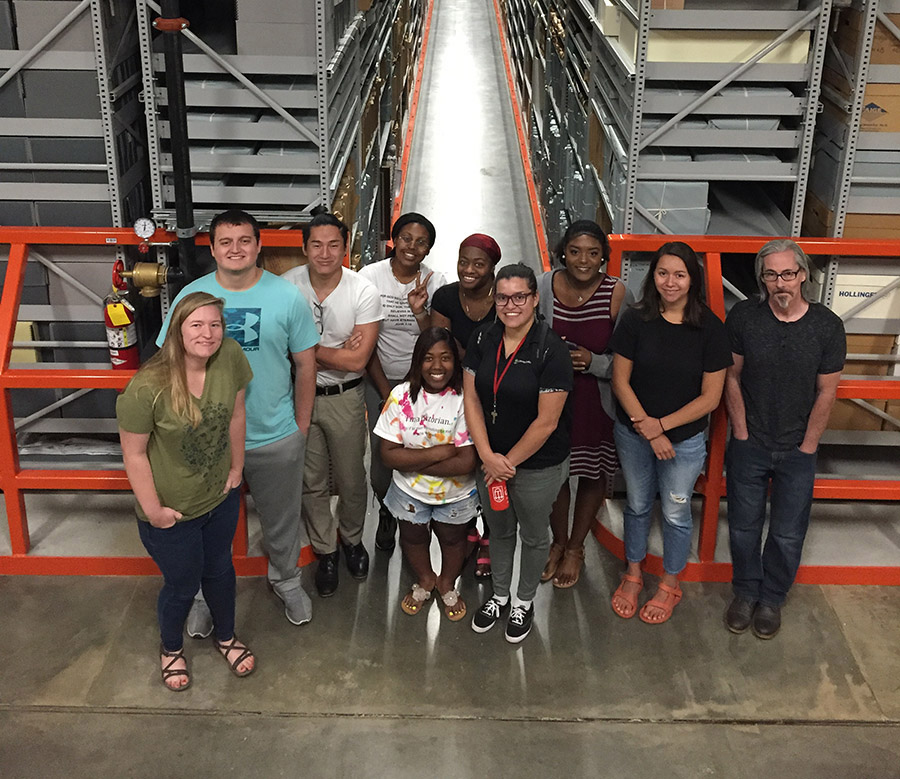The history department hosted eight undergraduate students during July for the History Fellows Summer Institute. The program is an opportunity to share the University of Georgia with college students from underrepresented groups attending schools around the region and to build better relationships with their institutions. The focus of the History Fellows Summer Institute is to create broad new inroads for underrepresented students from Georgia and beyond on campus, including women in STEM disciplines, older returning students, military veterans and first-generation college students.
“Very few history departments are running anything like our summer program, and we’re excited and optimistic about its potential. Diversifying higher education is a huge priority, and recent studies suggest that improving the pipelines into graduate school is the key to success,” said Stephen Berry, the Gregory Professor of the Civil War Era and faculty coordinator of the summer program. “Our program is also a lot of fun. It is an intensive residential experience, so we all get to know each other well, which gives us a chance to gel as a cohort. The talent and energy of these students is incredible.”
The Summer Fellows spent July at UGA living on campus and becoming immersed in the rigors of historical research. Under the supervision of faculty, fellows learn how to work in archival materials, interpret photography and material culture, create digital projects, formulate arguments about the past and manage their own research projects. In addition to their time in the classroom, the group also spent time at historical landmarks in Georgia including the Chief Vann House, a brick home constructed in 1804 by James Vann, a Cherokee Native American leader and wealthy businessman.
Now in its second year, the program has evolved to include a specific research project for each of the students focused around a theme. This year’s theme was “The Water Project,” inspired by the Global Georgia Initiative at the Willson Center for Humanities and Arts.
Jacob Finegan, rising junior at the University of Central Florida, became interested in the association between population centers and waterways and the way technology allows populations to move away from waterways.
“For the scope of the project, I tried to determine how being away from natural water sources by using technologies like dams, canals and reservoirs affect demographic outcomes,” said Finegan. “To further my research, I want to do a development comparison of Atlanta, a city that formed at the cross-section of two railways, to Savannah, a city formed based on its proximity to a natural water source.”
Daniela Aguirre, rising senior at UCF and veteran, had a different take on water, taking the phrase “blood is thicker than water” as the center of her research project.
“My research shows how blood, specifically African blood, has been used to withhold, deny or undermine American identity, even in cases where citizenship was assured. Even in cases where one’s physiology was visibly white,” said Aguirre. “My research also shows where individuals have chosen their identity despite their blood, a theme that relates to the longer, original quote: ‘The blood of the covenant is thicker than the water of the womb.’ These polar outcomes provide a degree of agency that exists in answering the loyalty question and reveal a tumultuous middle where one belongs to two worlds and none.”
The eight students, from University of Central Florida, Xavier University, Otterbein University, Mississippi State University and Pittsburg State University, lived in the residence halls and enjoyed campus amenities. The program, supported by Kay and John Parker, will continue in the summer of 2020. A UGA alumnus, John Parker graduated in 1973 with a bachelor’s degree in history.


